News
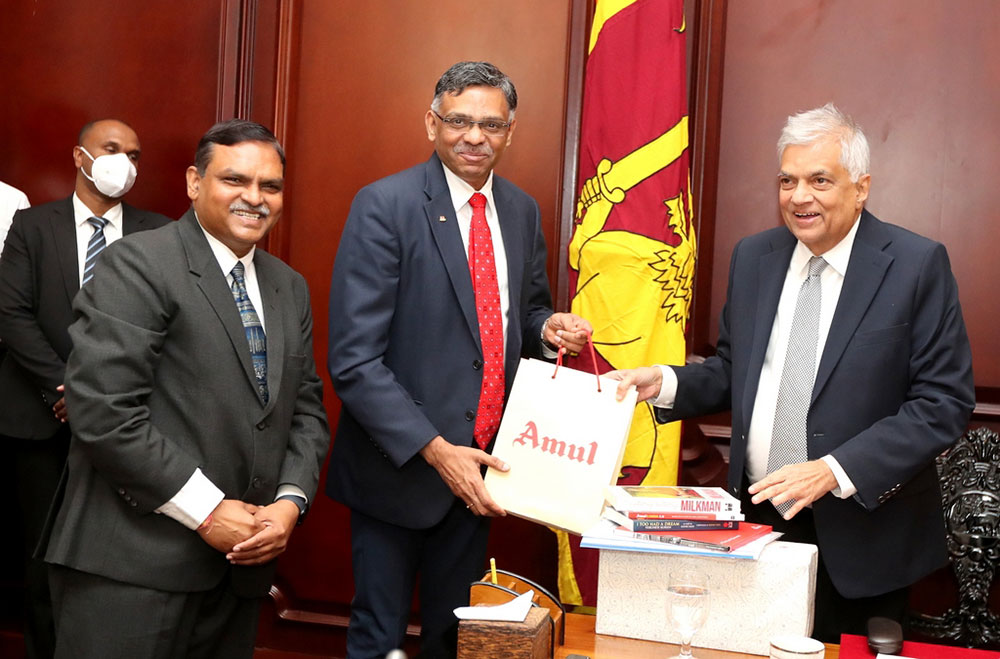
President holds talks with Indian officials on raising national milk production
Indian High Commissioner Gopal Baglay called on President Ranil Wickremesinghe at the Presidential Secretariat today (04), the President’s Media Division (PMD) reported.
The discussions focussed on raising national milk production and providing necessary technical support to the production of liquid milk in Sri Lanka together with the National Dairy Development Board (NDDB) of India and Amul Milk Company.
The PMD stated that the objective is to make Sri Lanka self-sufficient in milk and milk products in the long term with short and medium-term goals to double local milk production.
The President appointed a committee consisting of representatives of the public and private sectors to work with the multidisciplinary team of the National Dairy Development Board of India to prepare a short, medium and long-term plan for the development of the dairy sector in the country. This endeavour is aimed at preventing the decline in milk production and dependence on imported milk in Sri Lanka.
The PMD added that the discussion was held between the members of the committee and representatives of the National Dairy Board of India (NDDB).
The discussion was attended by Indian High Commissioner Gopal Baglay, Dr. Rakesh Pandey, First Secretary Economic and Commercial Affairs, representatives of the National Dairy Development Board of India and Amul Milk Company, Sagala Ratnayake, Senior Advisor to the President on National Security and Chief of Presidential Staff, Saman Ekanayake, the President’s Secretary, and a group of public and private sector representatives appointed by the President.
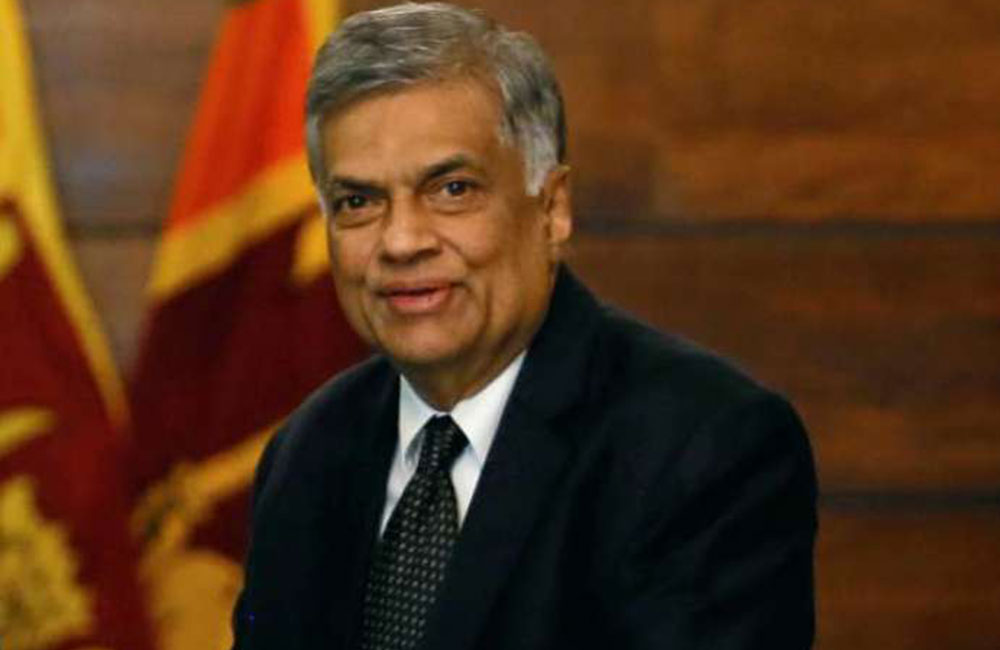
Economy & System change: President’s new year message
We are looking at the New Year 2023 after having undergone the bleakest of times, immense hardships, as well as the uncertainties and hopelessness of the last year.
I understand the great burdens that are placed on all of us and the setbacks that a majority of us have suffered due to the country’s abject economic collapse. Yet I believe that we have already gone through the worst of these times. I sincerely appreciate all of you who are committed to our country first and I thank you for your patience and courage as we took the critical, initial steps to stabilise the economy.
Indeed, 2023 will be a critical year in which we plan to turn around the economy.
2023 is also the 75th year of independence from the British Empire. Looking back, it is obvious that we have not done as well as other ex-colonies. This is why the youth of our country are calling for a system change – especially at this juncture. This cannot be ignored.
Therefore, we must boldly implement the proposed social, economic and political reforms to build a prosperous and productive Sri Lanka in the coming decade.
I wish all of you a happy and peaceful new year!
Ranil Wickremesinghe
President
Democratic Socialist Republic of Sri Lanka

Gas price to be reduced
Litro Gas Lanka Ltd. has decided to reduce the prices of domestic LP (liquefied petroleum) gas from tomorrow (Jan. 05).
The chairperson of the company, Mr. Muditha Peiris stated that the price of a domestic LP gas cylinder weighing 12.5kg is expected to be slashed by an amount ranging between Rs. 200 and Rs. 300.
Accordingly, the exact figures will be announced tomorrow (Jan. 05).

Pope Emeritus Benedict XVI passes away - Vatican
Pope Emeritus Benedict XVI, 95, passed away on Saturday at 9:34 AM Vatican time in his residence at the Vatican's Mater Ecclesiae Monastery, the Vatican announced.
"Pope Emeritus Benedict XVI has returned to the Father’s House," the Vatican said in a statement.
"As of Monday morning, 2 January 2023, the body of the Pope Emeritus will be in Saint Peter's Basilica so the faithful can bid farewell," the Vatican said.
Funeral arrangements would be notified in the next few hours, the Vatican said.
Pope Francis last Wednesday visited the ailing Pope Emeritus and asked Christians worldwide to pray for Benedict XVI.
The former Cardinal Joseph Ratzinger of Germany was elected pope on 19th April 2005 on the death of Pope John Paul II, and served until 28th February 2013 when he became the first pope in 600 years to retire.
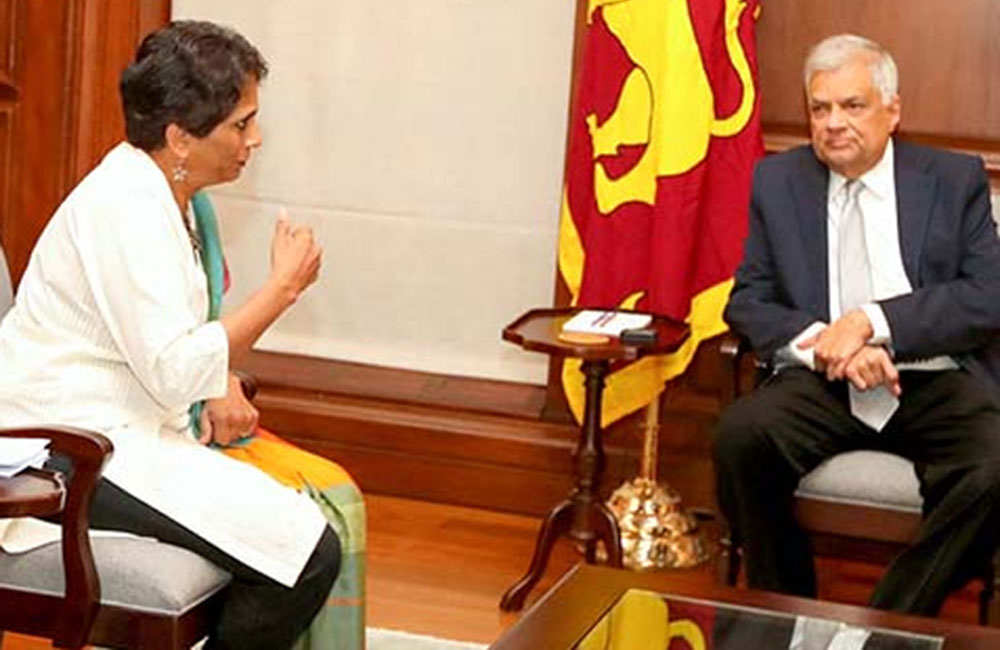
Top UN official Wignaraja discusses reforms, ethnic issues with President
President Ranil Wickremesinghe met with United Nations Assistant Secretary-General (ASG), United Nations Development Programme (UNDP) Assistant Administrator and Director of the UNDP Regional Bureau for Asia and the Pacific, Kanni Wignaraja today (04 Jan.), and briefed her on the ongoing political reforms and several other matters.
During their meeting at the Presidential Secretariat this morning, Wickremesinghe briefed the visiting delegation on the ongoing political reforms in Sri Lanka, including the establishment of the Constitutional Council in Parliament.
Further, discussions that are currently ongoing with other political parties with regard to resolving the country’s ethnic issues were also focused on, the President’s Media Division (PMD) said.
Wignaraja met with Prime Minister Dinesh Gunawardena and State Minister of Finance Shehan Semasinghe yesterday (03 Jan.) in two separate meetings, during which she reiterated the UNDP’s continued support towards Sri Lanka.
During her meeting with the Premier, Wignaraja also applauded Sri Lanka’s road to recovery thus far, affirming that the country is now ‘heading in the right direction’.

ATM robberies reported from three cities
ATM robberies have been reported in three main Southern cities of Sri Lanka.
According to the Police, a group has robbed the ATM machines of several banks in Karapitiya, Hikkaduwa, and Baddegama.
Nearly Rs. 11 million has been stolen by the group who are suspected to be foreigners.
The Police said Rs. 4.6 million, Rs. 275,000 and Rs. 5.7 million have been stolen from three seperate ATM machines.
The Police suspect that the robbery has been reportedly carried out via hacking the ATM software.

Excise duty on liquor & cigarettes increased
State Minister of Finance Ranjith Siyambalapitiya said that excise duty on all varieties of liquor, including wines, beer etc. will be increased by 20%.
He said that the excise duty for alcohol will be increased from midnight today (03).
Due to the 20% increase of Excise Duty on liquor, the prices of a bottle of 750ml Special Arrak will be increased by Rs. 206, locally brewed foreign liquor by Rs. 266, Beer (Vol. 4.8% – 625ml) by Rs. 21 & Beer (Vol. 8.8% – 625ml) by Rs. 39.
State Minister Ranjith Siyambalapitiya further said that the excise duty on cigarettes will also be increased by 20%.
He added that the excise duty for cigarettes will be increased with effect from the 1st of January 2023.
Rs.90 cigarette expected to cost Rs.105, Rs.85 cigarette expected to cost Rs.100, Rs.70 cigarette expected to cost Rs.80, Rs.60 cigarette expected to cost Rs.70, Rs.15 cigarette expected to cost Rs.24.
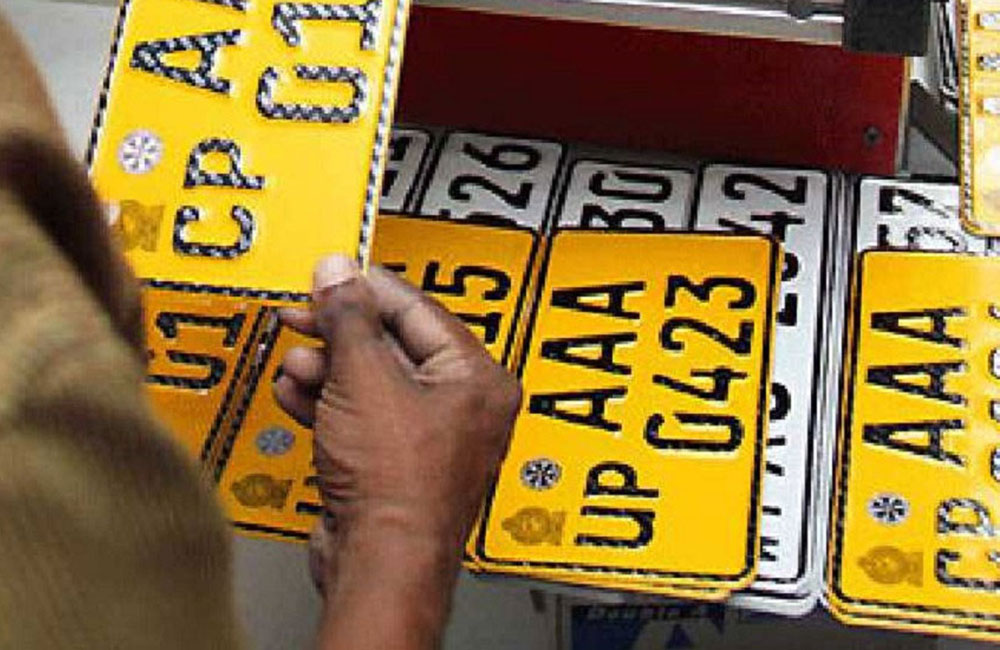
Vehicle number plates : New change from Jan 1st
English letters indicating the province of vehicle number plates will be removed from January 1, 2023, for new vehicle registrations, the Department of Motor Registration announced.
Both the customers as well as the Department of Motor Traffic have encountered many difficulties when number plates have to be changed every time the right of ownership of the vehicles is transferred between Provinces.
The decision has been taken to ease issues faced by customers and the Department of Motor Traffic when issuing vehicle licence plates.
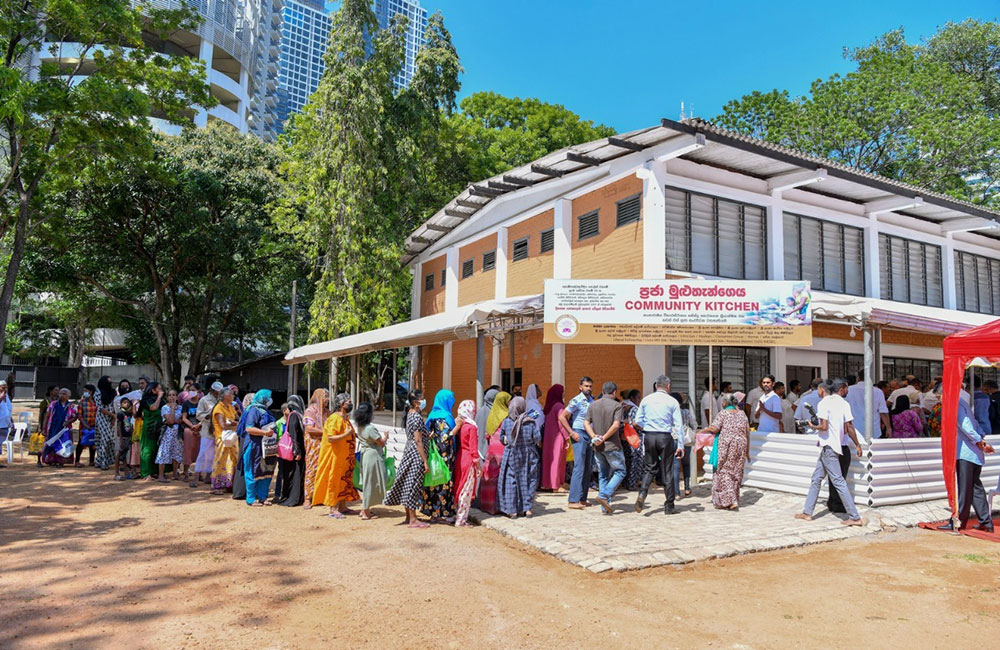
New Year community kitchen program launched to benefit 2500 families
A community kitchen program based at the historic Hunupitiya Gangaramaya Temple was launched yesterday (01) under the leadership of Senior Advisor to the President on National Security and President’s Chief of Staff Sagala Ratnayake.
According to the President’s Media Division (PMD), this program is being implemented targeting 2500 families in Hunupitiya in the Slave Island Police Division, Slave Island, Galle face, Ibbanwela and Wekanda DS Divisions, who are finding it difficult to get food.
This daily community kitchen program will run for 40 days from the 01st of January.
During this period, the government has taken steps to improve the economic conditions through welfare programs such as creating self-employment opportunities, providing professional training, and providing social development to the people of the beneficiary families.
The PMD further said that this community kitchen is run with the help of the Gangaramaya temple donors, the triforces, the police, the Civil Security Department, and government agencies, as well as the International Lions Club, Rotary Club, and many private organizations, under the guidance of the Presidential Secretariat.
Senior Advisor to the President Ruwan Wijewardene, former Minister Daya Gamage, Secretary to the Ministry of Defence General Kamal Gunaratne (retired), Chief of Defence Staff General Shavendra Silva, Commanders of the three armed forces, Inspector General of Police, Director General of the Civil Security Department, Coordinating Secretary to the President Rajitha Abeygunasekara, Presidential Media Director W.M.K. Wijayabandara and other officials were present at the inauguration.
https://english.newstube.lk/news?start=3264#sigProIda25506a0b7
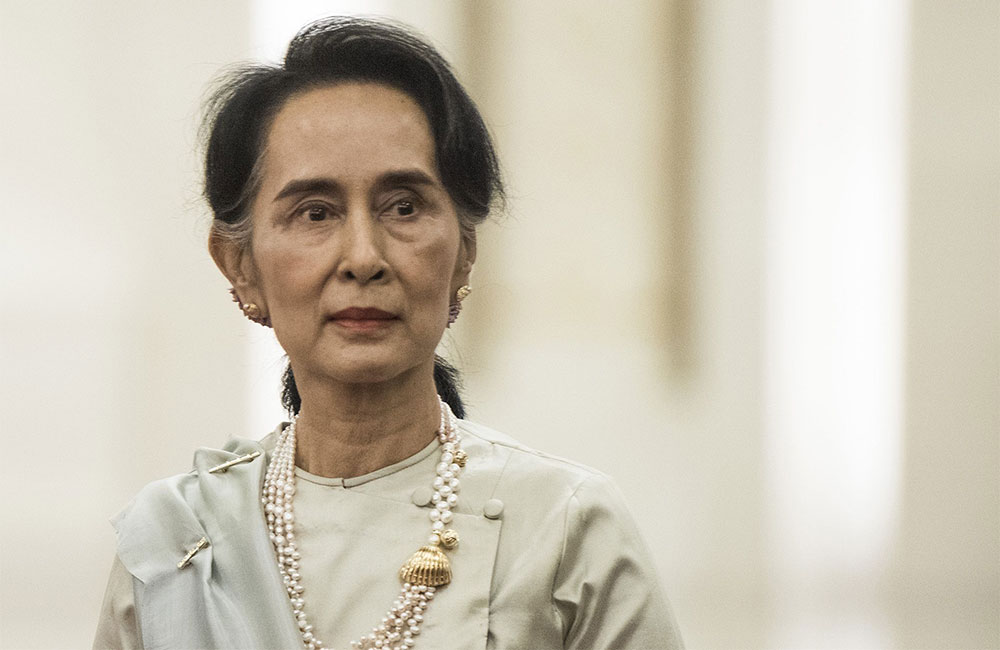
Suu Kyi jailed for a further seven years, taking her overall jail time to 33 years
A Myanmar military court has sentenced Aung San Suu Kyi to a further seven years in prison, taking her overall jail time to 33 years.
The country's former democratically-elected leader has been under house arrest since a military ousted her government in a coup in February 2021.
Since then she's faced 18 months of trials on 19 charges - which rights groups say are a sham.
The UN Security Council called for her release last week.
On Friday she was sentenced on the final five charges she faced. A court found her guilty of corruption because she had not followed regulations in renting a helicopter for a government minister.
She had already been convicted of 14 different crimes including breaching Covid public safety rules, importing walkie-talkies and violating the official secrets act.
Her trials this year have been set behind closed-doors where the public and media are barred access and her lawyers are also banned from speaking to journalists. She has denied all the charges against her.
The 77-year-old Nobel laureate has spent most of her time in detention under house arrest in the capital Nay Pyi Taw.
Ms Suu Kyi and many members of her party are among more than 16,600 people who have been arrested by the junta since they seized power - 13,000 remain in prison, according to the Assistance Association for Political Prisoners (Burma).
Last week the UN Security Council called for an end to violence in Myanmar and the release of all political prisoners. China and Russia abstained from the vote and did not use their veto power following amendments to the resolution's wording.
Amnesty International has previously said the "relentless legal assault" on Ms Suu Kyi shows how the military has "weaponised the courts to bring politically motivated or farcical charges against opponents".
The military's violent seizure of power last February triggered widespread demonstrations, prompting Myanmar's military to crack down on pro-democracy protesters and activists.
It also triggered renewed internal fighting between separate ethnic rebel groups, a civilian force resisting the military and the junta rulers.
The junta has been accused of extrajudicial killings and launching airstrikes on civilian villages. It's estimated more than 2,600 people have been killed in the military's crackdown on dissent so far.
BBC

Former British PM Cameron meets President Ranil while on holiday in SL
Former British Prime Minister David Cameron called on President Ranil Wickremesinghe at the Presidential Secretariat today (02).
The President’s Media Division (PMD) said that David Cameron is on a personal visit to Sri Lanka.
During a friendly discussion, Cameron extended his best wishes to President Wickremesinghe for the New Year.
The President’s Senior Adviser on National Security and President’s Chief of Staff, Sagala Ratnayake, the President’s Secretary Saman Ekanayake, and the Director of International Affairs for the President were also present at this discussion.
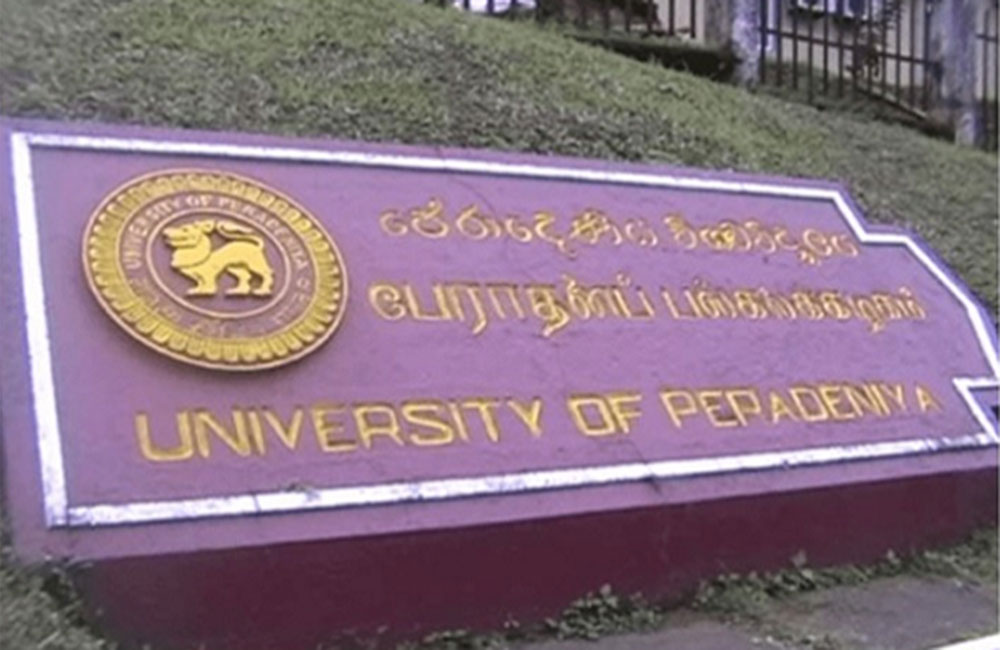
Former Peradeniya University student leader arrested
The Criminal Investigations Department on Thursday (29) arrested the Former Chairman of the Student Union of the University of Peradeniya Anuradha Vidanage.
Sri Lanka Police said that he was arrested over the incident where the Former Vice Chancellor of the University of Peradeniya, and his son were assaulted by a group.
The arrest was made opposite the Kandy Court Complex on Thursday (29) evening.
The current Chairman of the Student Union of the University of Peradeniya Chamid Sathsara said that the Former Chairman was arrested while returning from a legal matter in court.
Page 273 of 660
